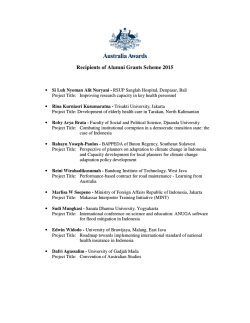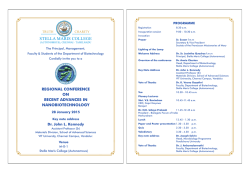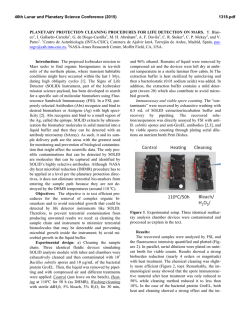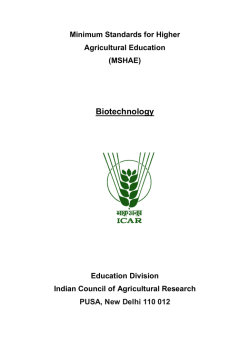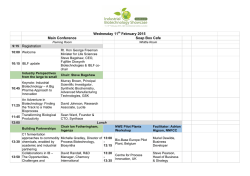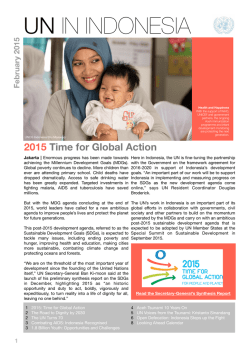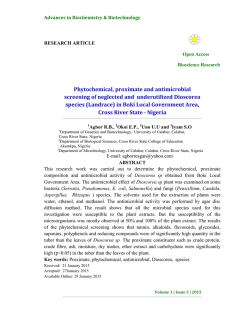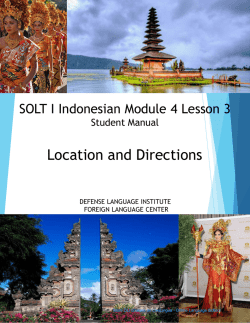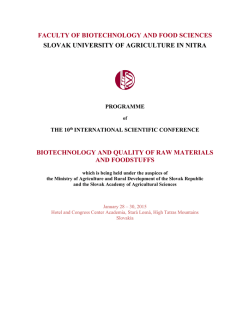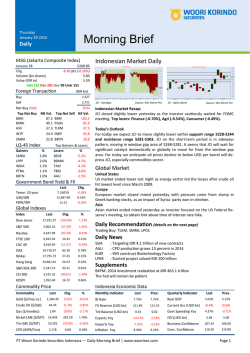
Program of the International Symposium for the Conservation
Program of the International Symposium for the Conservation and Sustainable Use of Asian Microbial Resources 13th, October Wednesday Opening Ceremony 13:30 - 13:50 Session 1 Microbial Diversity in Asia no. 13:50 – 15:10 Chairperson: Akira Nakagiri NITE, Japan title Analysis of kimchi microflora by culture1-1 dependent and independent approach name Jung-Sook Lee Michiko Tanaka 1, Taiki 1 Isolation, identification, and Katayama , Tomoko Kato1, Anatoli characterization of 1-2 microorganisms trapped in Brouchikov2, Thomas ancient permafrost ice A. Douglas3, Masami wedge Fukuda4, and Kozo Asano1 1-3 Joint-sampling on Brunei forest microbes: update Mahmud Yussof and Zaeidi Hj Berudin organization Korean Collection for Type Cultures (KCTC), KRIBB, Korea 1 Research faculty of Agriculture, Hokkaido University, Hokkaido, Japan, 2Geocryology Department, Moscow State University, Moscow, Russia, 3Cold Regions Research and Engineering Laboratory, Alaska, USA, 4 International Arctic Research Center, University Alaska, USA Forestry Department, Ministry of Industry and Primary Resources, Brunei Poster presentation & Coffee break 15:10 – 15:45 15:45 – 16:40 1 Plant Biotechnology Program, NIGAB, National Agricultural Research Centre, Iftikhar Ahmed , Rifat Pakistan, 2Department of Soil Science & Hayat2, Muhammad SWC, PMAS Arid Agriculture University, Ehsan2, Aneela Roohi3, Pakistan, 3Department of Microbiology, and Muhammad Iqbal1 Kohat University of Science and Technology, Pakistan 1 Chairperson: Atsushi Yamazoe NITE, Japan Diversity of beneficial 1-4 microbial resource from Pakistani ecology Complete genome sequence of bacterial endosymbionts of termite1-5 Moriya Ohkuma gut protists and exploiting yet-uncultured microbial resources RIKEN BioResource Center, Japan Session 2 Bioproduction from Asian Microbial Resources (1) no. title name organization 16:40 – 17:40 Chairperson: Kazuhito Fujiyama Osaka Univ., Japan Novel bacteriocins of thermotolerant lactic acid 2-1 bacteria from Asian microbial resources Exploration of thermotolerant useful 2-2 microbes in tropical environments and their application Kenji Sonomoto, Takeshi Zendo, and Jiro Nakayama Laboratory of Microbial Technology, Department of Bioscience and Biotechnology, Faculty of Agriculture, Graduate School, Kyushu University, Japan Mamoru Yamada Applied Molecular Bioscience, Graduate School of Medicine and Department of Biological Chemistry, Faculty of Agriculture, Yamaguchi University, Japan Reception 18:00 – 20:00 14th October, Thursday Special Talk title 9:30 – 9:50 name Twin Conventions: Climate Change (UNFCCC) and Itaru Yasui Biological Diversity (CBD) organization National Institute of Technology and Evaluation (NITE), Japan Session 2 Bioproduction from Asian Microbial Resources (2) no. 9:50 – 11:20 Chairperson: Mamoru Yamada Yamaguchi Univ., Japan title Construction of bagasse decomposing microbial communities In Thailand 2-3 and Japan – An attempt for comparative biotechnology? – name Yasuo Igarashi1, Shunsuke Kudo1, and Verawat Champreda2 Lily Eurwilaichitr1, Warasirin Sornlake 1, Microbial utilization from Panida Matetaviparee1, 2-4 Thai-isolated fungi: current Supattra Kittikhun1, status and future prospect Sutipa Tanapongpipat2, and Verawat Champreda1 organization 1 Department of Biotechnology, University of Tokyo, Japan, 2Enzyme Technology Laboratory, BIOTEC, Thailand 1 Enzyme Technology Laboratory, Bioresources Technology Unit, National Center for Genetic Engineering and Biotechnology (BIOTEC), Thailand, 2 Microbial Cell Factory Laboratory, Bioresources Technology Unit, National Center for Genetic Engineering and Biotechnology (BIOTEC), Thailand 3 Diversity of yeasts from high temperature regions of India, and pullulan 2-5 production by an osmotolerant Aureobasidium pullulans Biochemical Engineering Research & Process Development Centre (BERPDC), 1 Puja Saluja1,2, Anirban India, Microbial Type Culture Collection and Gene Bank (MTCC), Institute of Microbial Roy Choudhury3, and Technology (IMTECH), Council of Scientific G. S. Prasad1 and Industrial Research (CSIR), India, 2 Division of Biology, California Institute of Technology, USA Lunch time 11:20 – 13:00 Section 3 Potential of Asian Microbial Resources for Bioindustry no. 13:00 – 14:50 title Joint research projects 3-1 with Asian countries and NITE name Katsuhiko Ando Chairperson: Tropical microorganisms in Kenji Sonomoto 3-2 natural product based drug Hideyuki Muramatsu Kyushu Univ., Japan discovery Access and use of Asian 3-3 microbial resources in Chugai Yuichi Yamaguchi1, Takamichi Ohdake 1, Yoshie Nagahashi1, Hideyuki Katoh1, Katsuhiko Ando2, Shigeki Inaba2, Duong Van Hop3, Tsetseg Baljinova4, and Masahiro Aoki1 Identification and evaluation of microbes 3-4 derived from Mongolian traditional fermented milk Gentaro Yasuda1, Tadashi Shinoda1, Tsetseg Baljinova2, Katsuhiko Ando3, and Naoyuki Yamamoto1 organization NITE Biotechnology Development Center (NBDC), Japan Fermentation Research Div., Astellas Research Technologies Co., Ltd., Japan 1 Chugai Pharmaceutical Co., Ltd, Japan, NITE Biotechnology Development Center (NBDC), Japan 3Institute of Microbiology and Biotechnology, Vietnam National University, Hanoi (IMBT-VNUH), Vietnam 4Institute of Biology, Mongolian Academy of Sciences (MAS), Mongolia 2 1 Microbiology & Fermentation Lab., Calpis Co., Ltd., Japan, 2Institute of Biology, Mongolian Academy of Sciences (MAS), Mongolia, 3NITE Biotechnology Development Center (NBDC), Japan Coffee break 14:50 – 15:10 Session 4 Microbial Research Network no. 15:10 – 16:50 Chairperson: Yeonhee Lee KNRRC, Korea title name International exchange and collaborative research in 4-1 southeast asia; issues on Kazuhito Fujiyama bioresources, research and its outcome RNAM: A new platform for research in applied and 4-2 Huang Li environmental microbiology in China Paradigm shift in access to genetic resources: an 4-3 example of MongoliaTsetseg Balijinova Japan collaboration on diversity of Mongolian The Asian consortium for conservation and sustainable utilization of 4-4 microbial resources (ACM) Ken-ichiro Suzuki for the harmonized international cooperation in the CBD era organization International Center for Biotechnology, Osaka University, Japan Institute of Microbiology, Chinese Academy of Sciences, China Institute of Biology, Mongolian Academy of Sciences (MAS), Mongolia NITE Biological Resource Center (NBRC), Japan Panel Discussion: Sustainable use of microbial resources in the CBD era and cooperative model for research on microorganism in Asia 16:50 – 17:10 panelist Kazuhito Fujiyama Yasuo Igarashi organization International Center for Biotechnology, Osaka University, Japan Department of Biotechnology, University of Tokyo, Japan Chairperson: Ken-ichiro Suzuki NITE, Japan Kenji Sonomoto Laboratory of Microbial Technology, Department of Bioscience and Biotechnology, Faculty of Agriculture, Graduate School, Kyushu University, Japan Mamoru Yamada Applied Molecular Bioscience, Graduate School of Medicine and Department of Biological Chemistry, Faculty of Agriculture, Yamaguchi University, Japan Katsuhiko Ando Department of Biotechnology, National Institute of Technology and Evaluation (NITE), Japan 17:10 ‒ 17:15 Closing remarks Poster will be displayed throughout the symposium period Poster session no. title name IMCAS-BRC, an infrastructure to promote P1 Yu-Guang Zhou the sustainable application of microbial resources Indonesian microbial culture collection and its management, a foundation P2 toward sustainable use of microbial genetic resources Heddy Julistiono1, Atit Kanti1 Puspita Lisdyanti2, Yantyati Widyastuti2, and Endang Sukara2 Yantyati Widyastuti1, Puspita Lisdiyanti1, Shanti Ratnakomala1, Gina Kartina1, Roni Ridwan 1 Actinomycetes in Cibinong Rohmatussolihat , Evi P3 Science Center, Indonesia Triana2, Nunuk Widhyastuti2, Ratih D. Hastuti3, Yulin Lestari4, Misa Otoguro5, Hideki Yamamura5, and Katsuhiko Ando5 organization Institute of Microbiology, Chinese Academy of Sciences, China 1 Research Center for Biology, Indonesian Institute of Sciences (LIPI), Indonesia, 2 Research Center for Biotechnology, Indonesian Institute of Sciences (LIPI), Indonesia 1 Research Center for Biotechnology, Indonesian Institute of Sciences (LIPI), Indonesia, 2Research Center for Biology, Indonesian Institute of Sciences (LIPI), Indonesia, 3Indonesia Soil Research Institute, Ministry of Agriculture, Indonesia, 4 Fac. of Mathematics and Sciences-IPB, Indonesia, 5NITE Biotechnology Development Center (NBDC), Japan Puspita Lisdiyanti1, Shanti Ratnakomala1, Roni Ridwan1, Gina Kartina1, Rohmatussolihat1, Misa Otoguro2, Hideki Yamamura2, Tomohiko Diversity of Actinomycetes P4 Tamura 2, Shinji isolated in Indonesia Miyadoh2, Evi Triana3, Arif Nurkanto3, Yulin Lestari4, Ratih D. Astuti5, Rasti Saraswati5, Yantyati Widyastuti1, and Katsuhiko Ando2 1 Research Center for Biotechnology, Indonesian Institute of Sciences, Jl. Raya Bogor Km. 46, Cibinong 16911, Indonesia, 2 National Institute of Technology and Evaluation (NITE), Chiba, Japan, 3Research Center for Biology, Indonesian Institute of Sciences, Indonesia, 4Faculty of Biology, Bogor Agriculture University, Indonesia, 5 Research Center for Soil, Ministry of Agriculture of Indonesia, Indonesia 1 1 P5 Current status and future plan of KCTC/BRC Jung-Sook Lee , Byung-Chan Kim1, Song-Gun Kim1, and Sangmee Lee2 Seung-Beom Hong, Soo-Jin Kim, Yi-Seul Korean Agricultural Culture Kim, Soon-Wo Kwon, P6 In-Cheol Park, Soon-Ja Collection(KACC) Seok, and Hang-Yeon Weon Yi-Seul Kim, HangYeon Weon, Soo-Jin Bacterial diversity and Kim, Soon-Wo Kwon, community structure of P7 Seung-Beom Hong, Infermented soybean Cheol Park, and Soonproducts in Korea Ja Seok The Korea National P8 Research Resource Yeonhee Lee Center Phetsamone Bioactive compound of Phommaxay1, endophytic actinomycetes Surioudong Sundara1, P9 from Laos medicinal plants Watanalai and their anti-microbial Panbangred2, and activities Takuya Nihira3 Comparison on the carbon source utilization of P10 Erwinia chrysanthemi stored in long-term storage medium Nor Ayshah Alia Ali Hassan, Rosnah Hassan, and Nuradni Hashim Halophilic bacteria of the genus Halobacillus with meso -diaminopimelic acid P11 in the cell-wall peptidoglycan found in Mongolia Nurymkhan Marjangul1, Yukiyo Fukunaga2, Katsuhiko Ando2, and Tsetseg Baljinova1 Korean Collection for Type Cultures (KCTC), Biological Resource Center (BRC),Korea Research Institute of Bioscience and Biotechnology (KRIBB), Korea, 2Ministry of Education, Science and Technology (MEST), Korea Korean Agricultural Culture Collection (KACC), Korea Korean Agricultural Culture Collection (KACC), Korea Korea National Research Resource Center (KNRRC), Korea 1 Science and Technology Research Institute, National Authority for Science and Technology, Lao PDR, 2Department of Biotechnology, Faculty of Science, Mahidol University, Thailand, 3International Center for Biotechnology, Osaka University, Japan Strategic Resource Research Centre, Malaysian Agricultural Research and Development Institute (MARDI), Malaysia 1 Institute of Biology, Mongolian Academy of Sciences (MAS), Mongolia, 2NITE Biotechnology Development Center (NBDC), Japan 1 National Culture Collection of Pakistan: Past, present P12 and the future - a country report Plant Biotechnology Program, NIGAB, Iftikhar Ahmed , Shazia National Agricultural Research Centre, Erum2, Muhammad Islamabad, Pakistan, 2Plant Genetic 1 Iqbal , and M. Shahid Resources Program, IABGR, National Agricultural Research Centre, Islamabad, Masood2 Pakistan 1 Monsalud RG1, Clavillas JDL1, Papa Anti-MRSA, -Vibrios and Ia1, Zulaybar TO1, C. albicans identified from P13 Leyesa EM1, Papa IA1, mangrove microorganisms Creencia AR1, Alonte in the Philippines JD2, Daquinag JM2, and Bautista VW 3 Philippine National Collection of Microorganisms (PNCM), BIOTECH, University of the Philippines-Los Baños, College, Laguna, Philippines; 2CAS, UPManila, Philippines; 3IMCB, The University of Tokyo, Japan P14 BCRC Culture Collection Bioresource Collection and Research Center (BCRC), Taiwan Yu-Fen Chen 1 1 Screening and characterization for P15 lignocellulosic degrading enzymes from leaf litter fungi Bubpha Techapattaraporn, Tanit Changthavorn, Wanchern Potacharoen, and Lily Eurwilachitr Animal, plant and microbial genetic resources Cung Thi Thu Thuy1, P16 conservation and Le Minh Sat2 management in Vietnam Enzyme Technology Laboratory, Bioresources Technology Unit, National Center for Genetic Engineering and Biotechnology (BIOTEC), Thailand, 2 Department of Nutrition and Feed Science, Fac. of Animal Sci. Diponegoro University, Indonesia, 3Microbial Cell Factory Laboratory, Bioresources Technology Unit, National Center for Genetic Engineering and Biotechnology (BIOTEC), Thailand 1 National Hospital of Gynaecology Obstetric Hospital, Ministry of Health of Vietnam, 2Ministry of Science and Technology, Vietnam Recent activities of the P17 Japan Society for Culture Collections (JSCC) Toyozo Sato, Takayuki Ezaki, Ryosuke Fudo, Fumie Kasai, Takuji Kudo, Akihiko Maruyama, Yuzuru Mikami, Yasuyoshi Japan Society for Culture Collections, Japan Nakagawa, Hideaki Sugawara, Masako Takashima, Naoto Tanaka, Makoto Watanabe and Kenichiro Suzuki NIES-collection: Microbial Culture Collection at P18 National Institutefor Environmental Studies, Japan Fumie Kasai, Masanobu Kawachi, Mayumi Erata, Fumi National Institute for Environmental Studies, Mori, Kosei Japan Yumoto,Mayumi Sato, Miwa Ishimoto, and Takuro Nakayama AOAC: Network of Asia P19 Oceania Algal Culture Collections Fumie Kasai1, Susan Blackburn2, Ian Jameson2, Masanobu Kawachi1, and Makoto M. Watanabe 3 1 National Institute for Environmental Studies, Japan, 2Australian National Algae Culture Collection, CSRIO, Australia, 3Graduate School of Life and Environmental Sciences University of Tsukuba, Japan Activity of RIKEN BioResource Center Masako Takashima, Kwang-Deuk An, Toshiya Iida, Takao Iino, Takashi Itoh, Tsutomu Oowada, Gen Okada, Yumi Oshida, Maki Kitahara, Kayo RIKEN BioResource Center, Japan Kusaoke, Takuji Kudo, Yoshimasa Kosako, Mitsuo Sakamoto, Motofumi Suzuki, Koji Suzu, Satoko Tsuzuki, and Moriya Ohkuma P21 Distribution of Asian Trichoderma species Yasuhisa Tsurumi1, Shigeki Inaba1, Rieko Suzuki1, Tomoaki Kamijo1, Yantyati Widyastuti2, Duong Van Hop3, Nyunt Phay4, Tsetseg Balijinova5, Nampiah Sukarno6, Akira Nakagiri1, Ken-ichiro Suzuki1, and Katsuhiko Ando1 P22 NITE's experience of Shun Shioya and access and benefit-sharing Katsuhiko Ando P20 P23 NBRC Microbial Culture Collection 2009 1 National Institute of Technology and Evaluation (NITE), Japan, 2Research Center for Biotechnology, Indonesian Institute of Sciences (LIPI), Indonesia, 3Institute of Microbiology and Biotechnology, Vietnam National University, Hanoi (VNUH), Vietnam, 4 Biotechnology Development Center, Pathein University (PU), Myanmar, 5Institute of Biology, Mongolian Academy of Science (MAS), Mongolia, 6Biology Department, Bogor Agricultural University (IPB), Indonesia NITE Biotechnology Development Center (NBDC), Japan Hitoe Fukawa, Yasuyoshi Nakagawa, NITE Biological Resource Center (NBRC), Maki Kikugawa, Japan Kazumi Sagisaka and Ken-ichiro Suzuki Preservation and P24 distribution of DNA resources at NBRC Katsutoshi Fujita, Junya Seita, Hiromi Kajiya, Takeshi NITE Biological Resource Center (NBRC), Harada, Hitoe Fukawa, Japan Kazumi Sagisaka, and Ken-ichiro Suzuki Quality control and reidentification of NBRC P25 filamentous fungal collection based on molecular data Sayaka Ban, Izumi Okane, Kaoru Yamaguchi, Akira Nakagiri, Shinzo Mayuzumi, Noriko Utsumi, Fumie Yokoyama, Toshihiro NITE Biological Resource Center (NBRC), Tanaka, Kyoko Japan Toyama, Yukiko Tabuchi, Miwako Genra, Kuniko Shimamura, Katsuhiko Ando, Ken-ichiro Suzuki
© Copyright 2026
